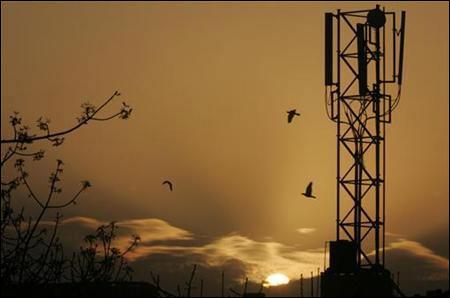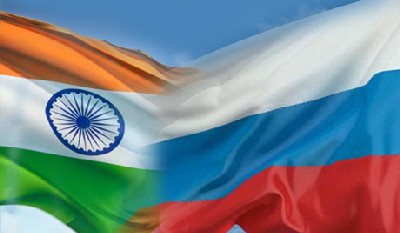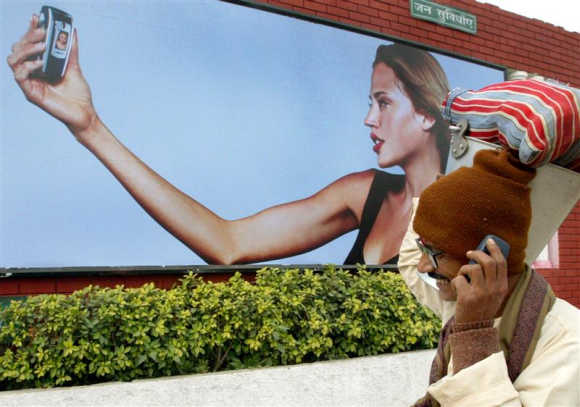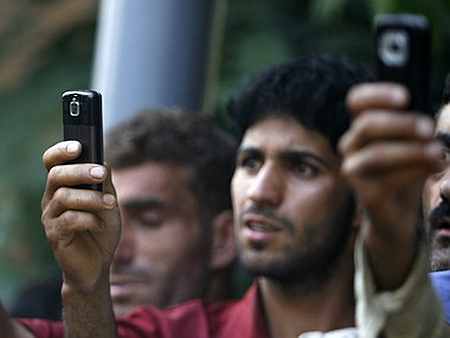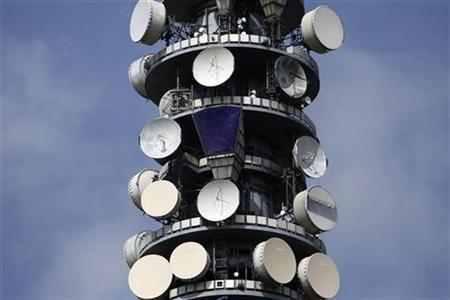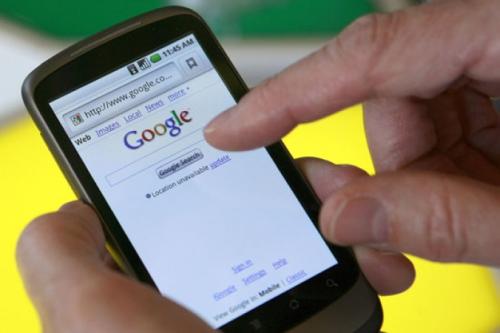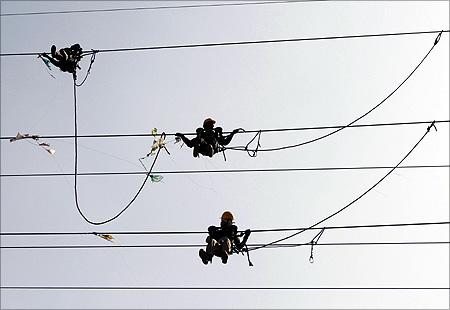 | « Back to article | Print this article |
How Sistema plans to strike it big in India
Mobile telephony is no longer Sistema's only interest in India.
It has signed a deal with state-owned BSNL to develop Russia's answer to GPS in the country -- and now hopes to sell devices that keep track of everything from buses and terrorists to loved ones.
Parents who want to keep a tab on their child's whereabouts throughout the day can now do so for as little as Rs 2,999.
Click NEXT to read further. . .
How Sistema plans to strike it big in India
Russian telecom major JSFC Sistema will soon launch a mobile phone embedded with a special chip through which parents who give this instrument to their kids can get their location on their mobile phone, whether it is on a GSM or a CDMA network, 24X7.
What makes this possible is Glonass -- the navigation and tracking system based on a network of 24 satellites circling around the globe.
It has been built by Sistema as an alternative to the US-owned global positioning systems, or GPS.
At the moment, most consumers in India use GPS on their mobile sets to support such features as locational services.
Click NEXT to read further. . .
How Sistema plans to strike it big in India
But that might change soon with large handset manufacturers like Apple (for its iPhone), Samsung and even Nokia now integrating Glonass in the chip of their phones.
The Russians estimate that about 10 per cent of all smartphones in the country already have chips which combine the two technologies.
It is a small number, but, they are confident, it will grow in the days to come.
It could increase because Sistema has now decided to aggressively sell the technology. India is one of the key markets it has identified for Glonass.
Click NEXT to read further. . .
How Sistema plans to strike it big in India
A few weeks ago, in end December, when Russian president Vladimir Putin had come for a one-day visit to India, media attention was concentrated on his talks with Prime Minister Manmohan Singh on the future of Sistema's CDMA services in the country, after its licence had been struck down by the Supreme Court in February.
Soon after Putin's visit, an empowered group of ministers has recommended that the reserve price for CDMA spectrum be slashed 30 per cent or 50 per cent for the next round of auctions in March.
This was seen as a victory of sorts for Sistema.
Click NEXT to read further. . .
How Sistema plans to strike it big in India
The Cabinet on Thursday agreed to reduce it by 50 per cent.
But what got lost in the media glare was the quiet deal that was struck between Sistema and state-owned Bharat Sanchar Nigam Ltd (BSNL, it offers telephony services, fixed-line as well as mobile, all over India except Mumbai and Delhi) to jointly develop Glonass services and applications in the country.
Click NEXT to read further. . .
How Sistema plans to strike it big in India
Russian rival
So what will the new alliance do?
And will this mean that Glonass and GPS will clash in the marketplace?
The Russians, of course, take pains to explain that the two systems do not compete with each other and actually complement each other.
However, they do say that unlike the US, which blocks out satellites in some troubled regions, Glonass does not, which results in better service.
Says Alexander A Chinyaev, chief representative of the Sistema group in India: "Glonass supplements GPS which also has 24 satellites by offering users more accuracy.
Click NEXT to read further. . .
How Sistema plans to strike it big in India
"Instead of say three to four satellites covering a guard area, you have eight satellites covering the same area with Glonass.
Our aim in India is to use Glonass to offer various services and applications by using the pan-India infrastructure and customers of BSNL and MTNL (another state-owned company that operates telephony services in Mumbai and Delhi).
It will also help us look at government contracts".
Hot on Sistema's agenda, especially after the outrage in Delhi during the brutal rape of a 23-year-old woman, is to offer a "safe bus" to the state.
Click NEXT to read further. . .
How Sistema plans to strike it big in India
Last year, Sistema undertook a pilot project with Delhi Transport Corporation where some buses were installed with IP cameras, a black box for recording camera footage, an emergency alarm connected to the control room and an online data transmission system through Glonass and MTS's mobile network.
Sistema, of course, is aware that a project like this would cost a lot of money and that it is not easy for a state-owned company, which runs its buses on subsidised fares to invest that money.
Click NEXT to read further. . .
How Sistema plans to strike it big in India
So, it has decided to sweeten the deal.
"We are aware that such a system is expensive.
That is why we have approached the Delhi government saying we will do this on the 'build, operate and transfer' basis.
We will offer the system free and recover our money in the next five to ten years through advertising revenues from the bus which includes LCD TVs," says Chinyaev.
Click NEXT to read further. . .
How Sistema plans to strike it big in India
Eye-catching act
The Russian company ran another pilot project at the Jaipur airport to showcase its technological prowess.
It was a system for face recognition of passengers.
Cameras took pictures of passengers standing at the immigration counters and matched it with the database available with the investigative agencies to check whether they were on the wanted list or terrorists.
Sistema is also in negotiations with logistic companies to offer their drivers a wearable tracker which will help them keep a tab on their trucks as well as their drivers.
Click NEXT to read further. . .
How Sistema plans to strike it big in India
And for women, it is looking at launching a bracelet tracker, a non-intrusive safety instrument.
Sistema also sees a huge potential in building smart cities which would include a network of surveillance cameras across streets.
The information gathered by these cameras will be beamed through the Glonass systems to an integrated police control room, facilitating prompt action by the police in turn.
So, in case of an accident, it can identify the nearest police van or ambulance or a hospital, alert it and save lives.
Click NEXT to read further. . .
How Sistema plans to strike it big in India
Sistema has already implemented it in Moscow in a multi-billion-dollar project.
But, even here, cost is the key impediment and Sistema is talking to the central government to see its practicality.
"Safety of the city or say handling medical emergencies and accidents are large projects which, of course, need budget sanctions.
That is why we are talking to the central government" says Chinyaev.
No one is more aware than Sistema that the challenge is to make the products affordable.
The company, for instance, is talking to Indian car manufacturers to include navigation systems in the car which combine Glonass with GPS but won't divulge their names.
Click NEXT to read further. . .
How Sistema plans to strike it big in India
But the fact is that most Indian customers do not find navigation systems affordable on their cars. One way that Sistema wants to reduce costs is to manufacture within the country.
And it is already looking for joint venture partners and would be happy if its mobile partner, the Shyam group, or even BSNL wants to join in, says Chinyaev.
That he says would substantially cut costs. The child tracker, for instance, could, thence, be made available at under Rs 1,000.
Surely, Sistema is looking beyond just mobile services in the country.
However, with many of the larger projects dependent on government funding, it has to hope that the BSNL association would be able to get it the breakthrough that it has been looking for.
